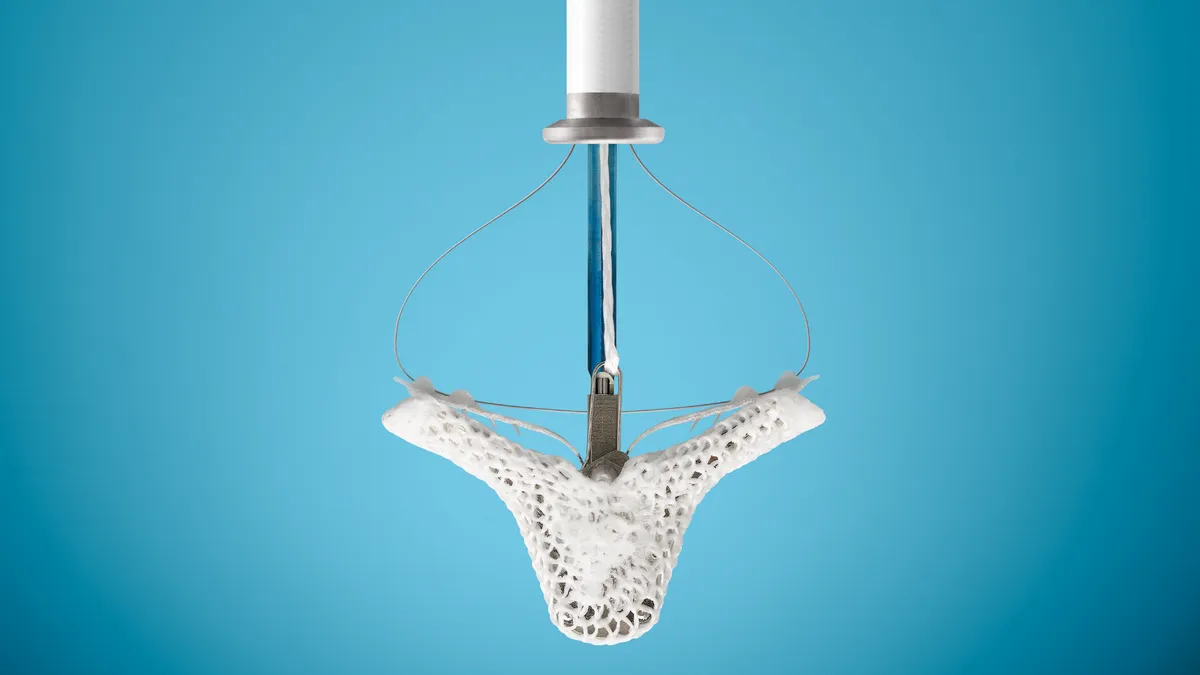Dive Brief:
- Awaiting a Medicare reimbursement decision any day for its MitraClip transcatheter mitral valve repair device, Abbott is expanding manufacturing capacity this year to prepare for significant growth in the procedure.
- A proposed decision memo from CMS on a national coverage determination (NCD) for MitraClip in a broader patient population was listed as due this past Friday on the agency's website, with completion of a national coverage analysis expected by May 14.
- Incoming Abbott CEO Robert Ford in January said CMS reimbursement for the expanded indication will be an "important building block" in what the company expects will be a multiyear, multibillion-dollar market opportunity for the device.
Dive Insight:
Abbott already has an NCD for MitraClip to treat patients with primary mitral regurgitation, in which an abnormal valve structure allows blood to flow backward in the heart. Now it is anticipating that CMS will expand the reimbursement policy to include the larger population of patients with secondary, or functional, mitral regurgitation, which develops when the heart's left ventricle becomes enlarged and prevents the valve's leaflets from closing properly.
In comments submitted to CMS backing expanded national coverage for transcatheter mitral valve repair, Abbott said results from the 614-patient COAPT trial support speeding access to more beneficiaries. That study showed patients with secondary regurgitation treated with MitraClip had significantly reduced mortality and heart failure hospitalizations compared to those who received medical therapy alone.
Heart specialists from several hospitals submitted comments echoing the company's view. "Treatment options are limited for symptomatic heart failure patients with reduced ejection and severe mitral regurgitation who are not responsive to optimal medical therapy and do not require revascularization," said Samir Kapadia, chairman of the Cleveland Clinic's cardiovascular medicine department. "It is critical that CMS provides reimbursement for this procedure for appropriately selected patients."
Gaining Medicare reimbursement for more mitral regurgitation patients should be an important catalyst for MitraClip sales, as private payers often follow the lead of CMS on coverage decisions, and Abbott is getting ready. On the company's fourth quarter earnings call in January, executives highlighted investments in manufacturing capacity expansion planned this year for MitraClip, along with the popular FreeStyle Libre glucose monitor.
FDA granted an expanded indication for MitraClip last March for patients with secondary mitral regurgitation, helping drive annual sales of the device up 30% year over year to nearly $700 million. Yet the market is only 5% penetrated, Ford told analysts on the call.
The company is looking to make the device available to more medical centers and will need to hire more sales representatives and invest in field clinical teams to make that happen, Ford said. Abbott also plans to study the device in moderate risk surgical patients.
Abbott CEO Miles White, who is stepping down March 31 after two decades at the helm, called MitraClip the "cornerstone" of the company's structural heart portfolio. Abbott's structural heart pipeline includes TriClip, a modified version of MitraClip to repair leaky tricuspid heart valves that the company expects to gain CE mark approval this year, and Tendyne, a minimally invasive mitral valve implantation system that received the CE mark in January.
AdvaMed, in its comments to CMS, recommended revising the title of the NCD in a way that would broaden its scope and provide flexibility for expanding coverage to new therapies as needed.










